CREATE at the International Conference on “Access, Transitions and Equity in School Education: Making Rights Realities” , 22nd - 23rd February 2011, New Delhi, India
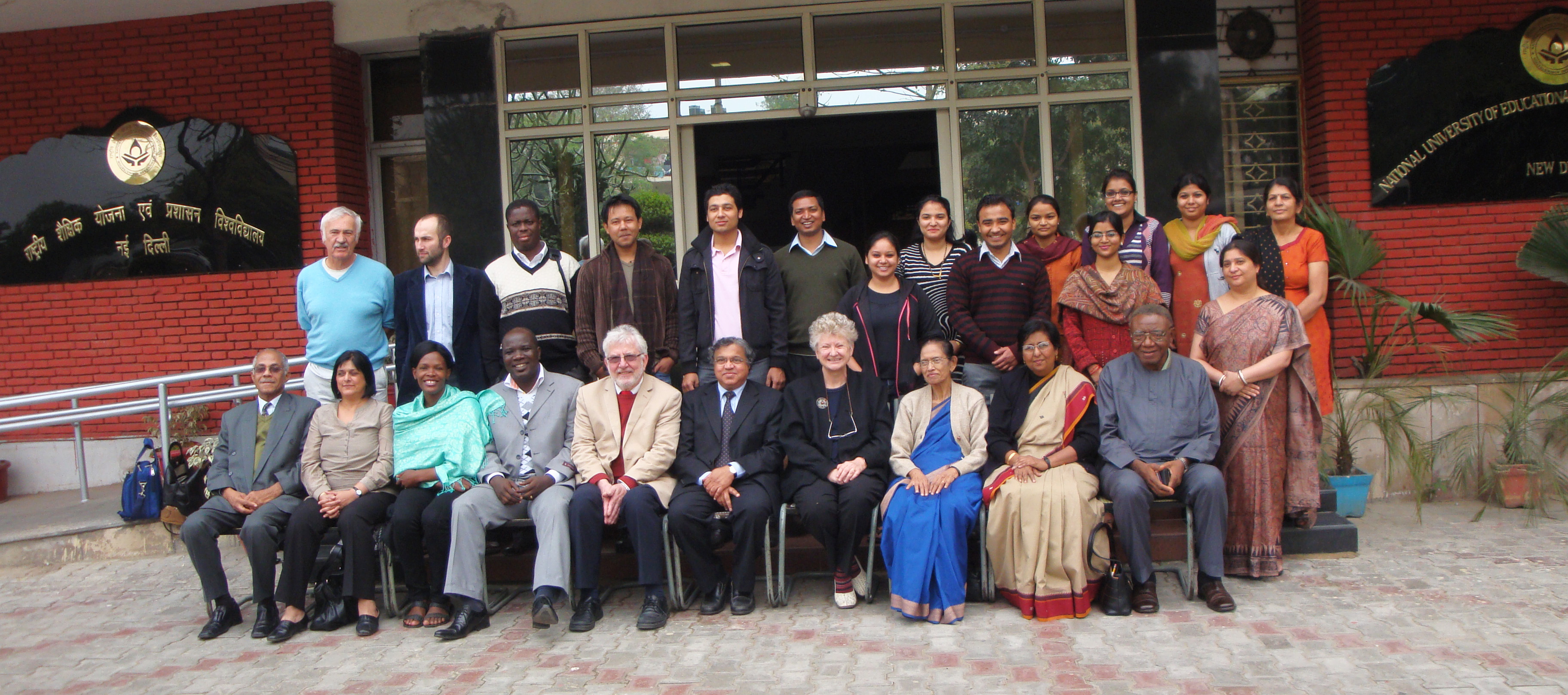
CREATE and NUEPA colleagues
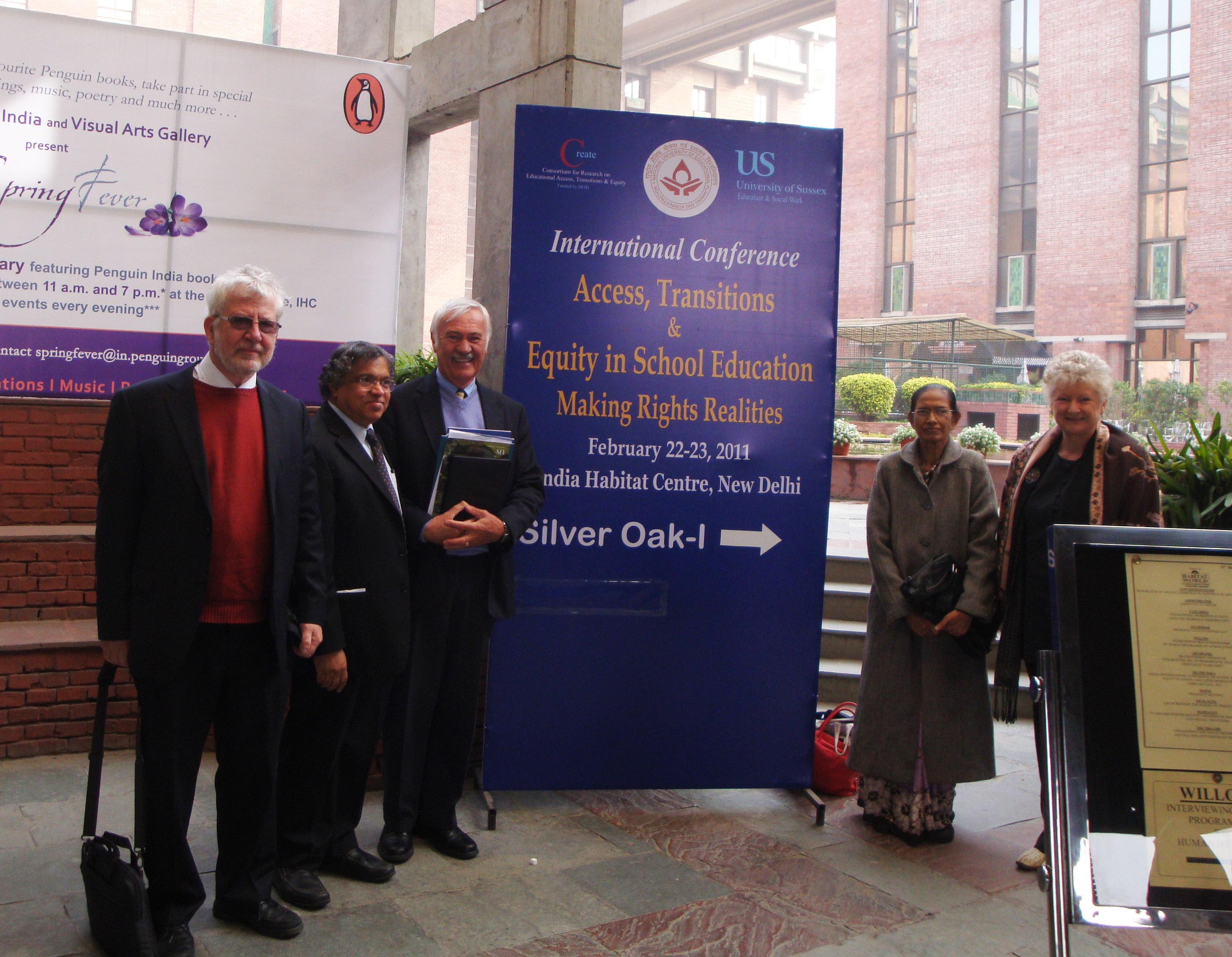
Day 1 - Prof Keith Lewin, Prof R. Govinda, Dr Paud Murphy, Prof Swarna Jayaweera and Prof Angela Little
“Access, Transitions and Equity in School Education: Making Rights Realities”
The two day International Conference on “Access, Transitions and Equity in School Education: Making Rights Realities” began on February, 22, 2011 at the India Habitat Centre, New Delhi with the inaugural address by Ms. Anshu Vaish, Secretary, Department of School Education and Literacy, Education, Ministry of Human Resource Development, Government of India.
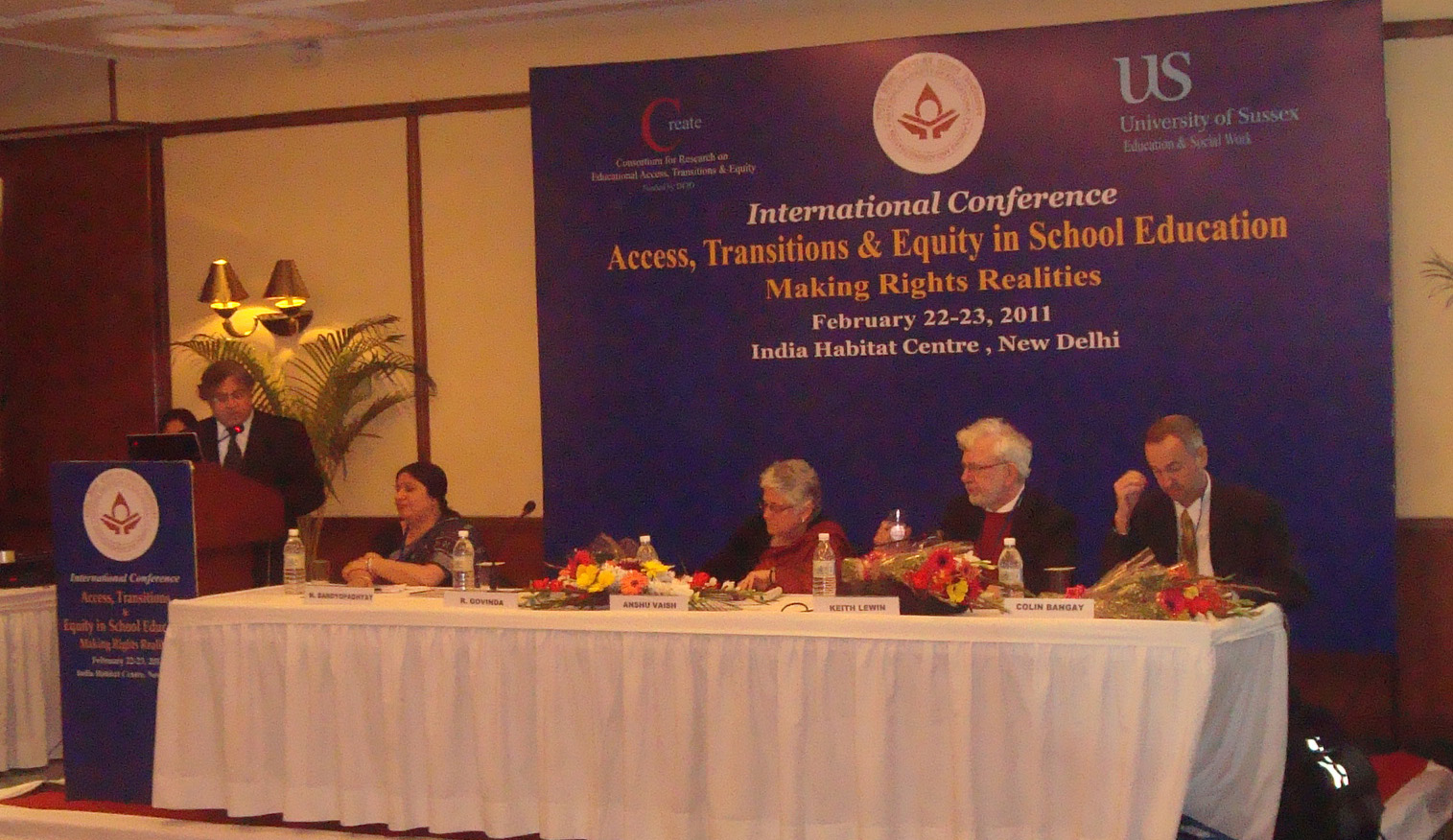
Welcome address by Prof. Govinda, Vice-Chancellor of the National University of Educational Planning and Administration (NUEPA), New Delhi with Secretary Anshu Vaish, Dr Colin Bangay and Dr. Madhumita Bandopadhyay
Prof. Govinda, Vice-Chancellor of the National University of Educational Planning and Administration (NUEPA), New Delhi gave the welcome address, he said that the main purpose of the conference is to share the findings, assess the situation, understand and the find the critical areas of elementary education in the four countries – India, Bangladesh, Ghana and South Africa. In addition, for India, he added, the conference holds special significance due to the paradigm shift in elementary education from a 10 year programme of Sarva Shiksha Abhiyan (SSA) to a rights based approach under the “Right to Education Act.” He also mentioned that the “Consortium for Research on Educational Access Transition and Equity (CREATE)” was started five years ago with seven institutions as partners and supported by DFID and the conference is the last gathering of the partners.
In her address, Ms. Anshu Vaish hailed the organisers for the timely holding of the conference as India has promulgated the Constitutional Act of “Right to Education” (RTE) till the age of 14 years. She highlighted the positive developments of “Universal Elementary Education” on near universal education and expansion of the school system in the country. In the same vein, she also mentioned of the barriers in the form of 4% to 5% of children being out of school, 75% retention and the lack of attention to the special needs of differently able students.
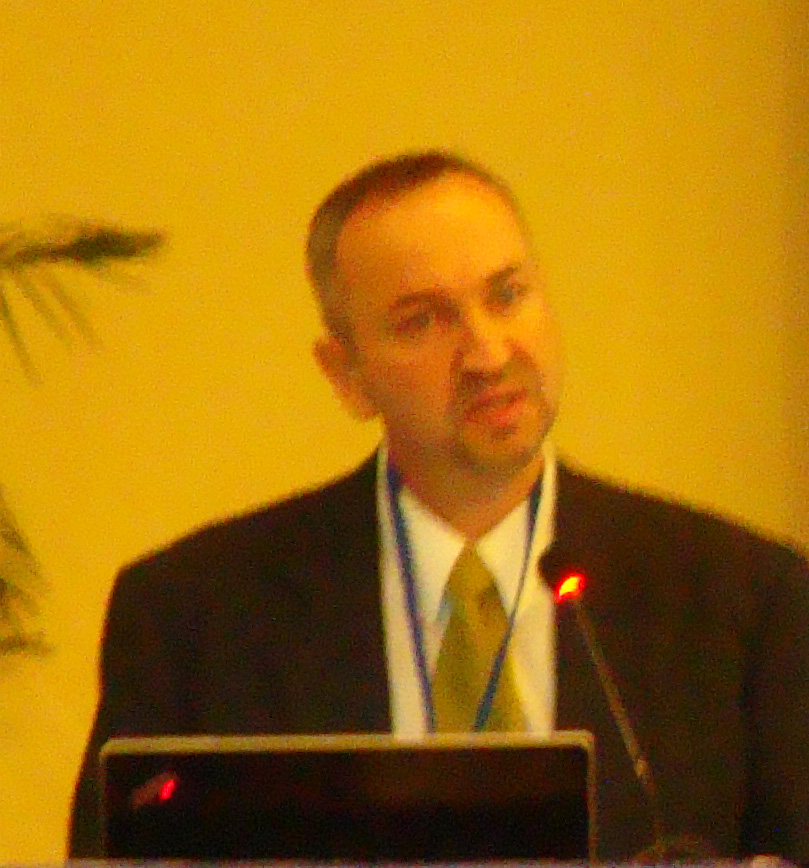
Dr. Colin Bangay, Senior Education Advisor, DFID India
Expressing concern for the children that are at the margins of the education system and acknowledging the contribution of CREATE, Dr. Colin Bangay, Senior Education Advisor, DFID India, observed that information or empirical data produce by the consortium plays an important role in the policy framing of different countries.
This interrelationship between the policy framing and information provided by CREATE affirms the primacy of political will in the universalisation of education observed Keith Lewin, Director of CREATE. The consortium is engaged with the systemic analysis of issues of access and of disadvantaged children, which relates to a lack of infrastructure, learning materials and lack of teachers. In addition, the consortium also works on silent exclusion of children from the learning process – absent in mind but present in class, and the presence of overage children in education.
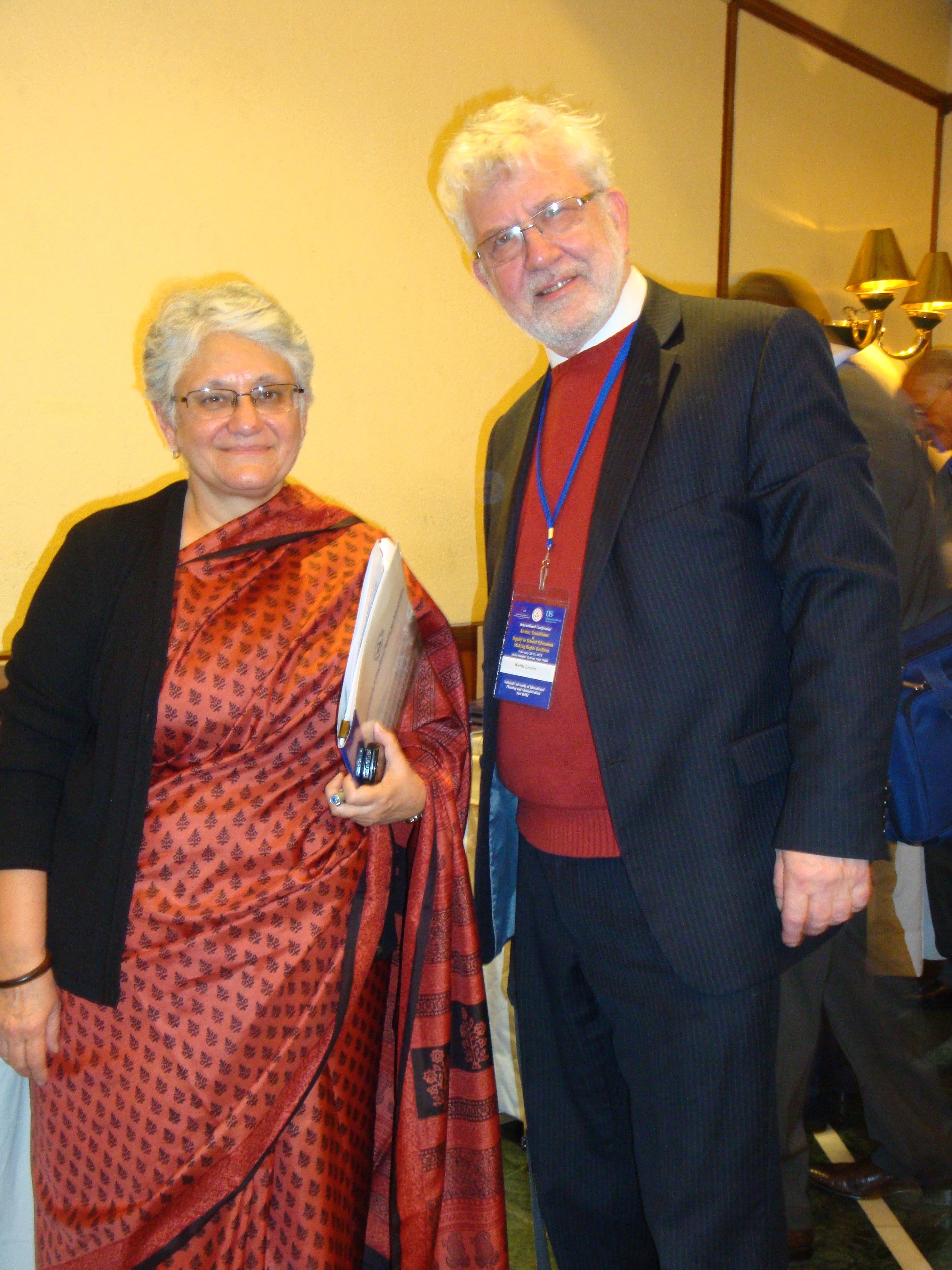
Prof Keith Lewin & Secretary Anshu Vaish
A tea break was followed by the Country Study Report India – “Overcoming Exclusion through Quality Schooling in India”, presented by Prof. R. Govinda with Prof. A. K. Jalaludin in as the chairman of the session. Prof. Govinda argued that even after expansion of the school system, of the enrolled students, only 70% complete 5 years of schooling and around 50% dropped out without completing the compulsory education period of 8 years.
Based on the survey from three districts – Rajnandgaon, Rewa and Dindori, Prof. Govinda explained that poor parents do send their children to school but school related factors like infrastructural facilities and attitude and behaviour of teachers have compelled the children to dropout. Moreover, absenteeism of teachers has an adverse impact on the children in not coming to schools. These factors perpetuate the inequalities existing in the society. So, improvement in physical provision of schooling, transformation of schools and classrooms holds the key for achieving Universialisation of Elementary Education (UEE).
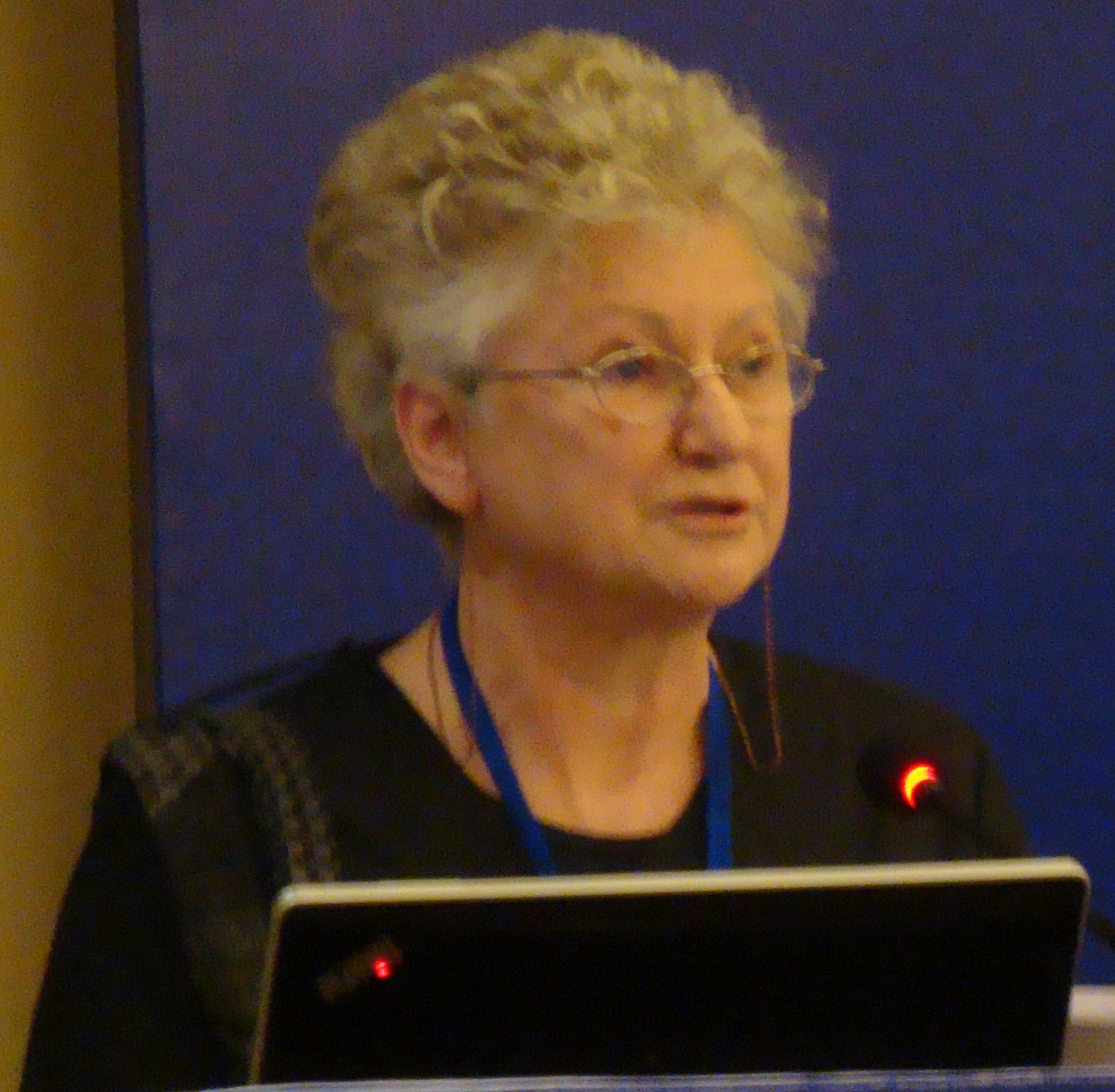
Prof Angela Little, Institute of Education, London, UK
The issue of ‘political will’, raised in the first session was taken to a deeper level in the Country Report on Sri Lanka by Prof. Angela Little on “The Politics, Policies and Progress of Basic Education in Sri Lanka”. Prof. Little put forward the thesis that there is a need for political environment where political will can be exercised. According to her ‘political will’ is the “sustained commitment of politicians and administrators to invest the necessary resource to achieve specific objectives and a willingness to make and implement policy despite opposition”. So, politicisation of education should be eliminated from the education system to bring out a policy reforms both at the structural & organisational level. But, political will can be a double edged sword, the national political will can be reinforced by the local political will or they can be antithesis to each other. Finally, Prof. Little concluded with the observation that political will is necessary but not sufficient. It needs to be supplemented by administrative, technical, financial and human resources and requires sustained attention to fulfil the objectives of Education For All.
In her chairman’s remark, Ms. Jayaveera, said that improvement in the quality of education in Sri Lanka was a product of various initiatives of incentive programmes of the government. The policy of Free Education shall continue and the commitment still exists among the political leaders. Taking a different approach to the issue of ‘political will’ and political interference, she is of the understanding that political interference does not have any impact on the quality of education.
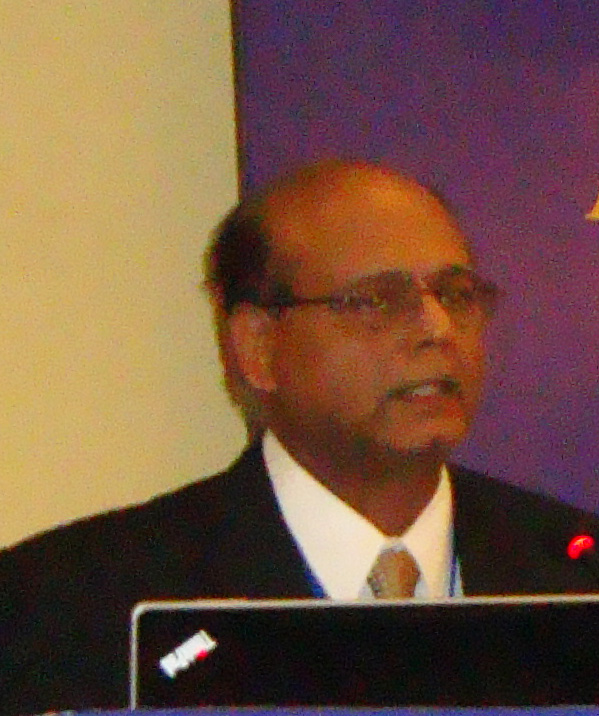
Prof Manzoor Ahmed, BRAC University, Bangladesh
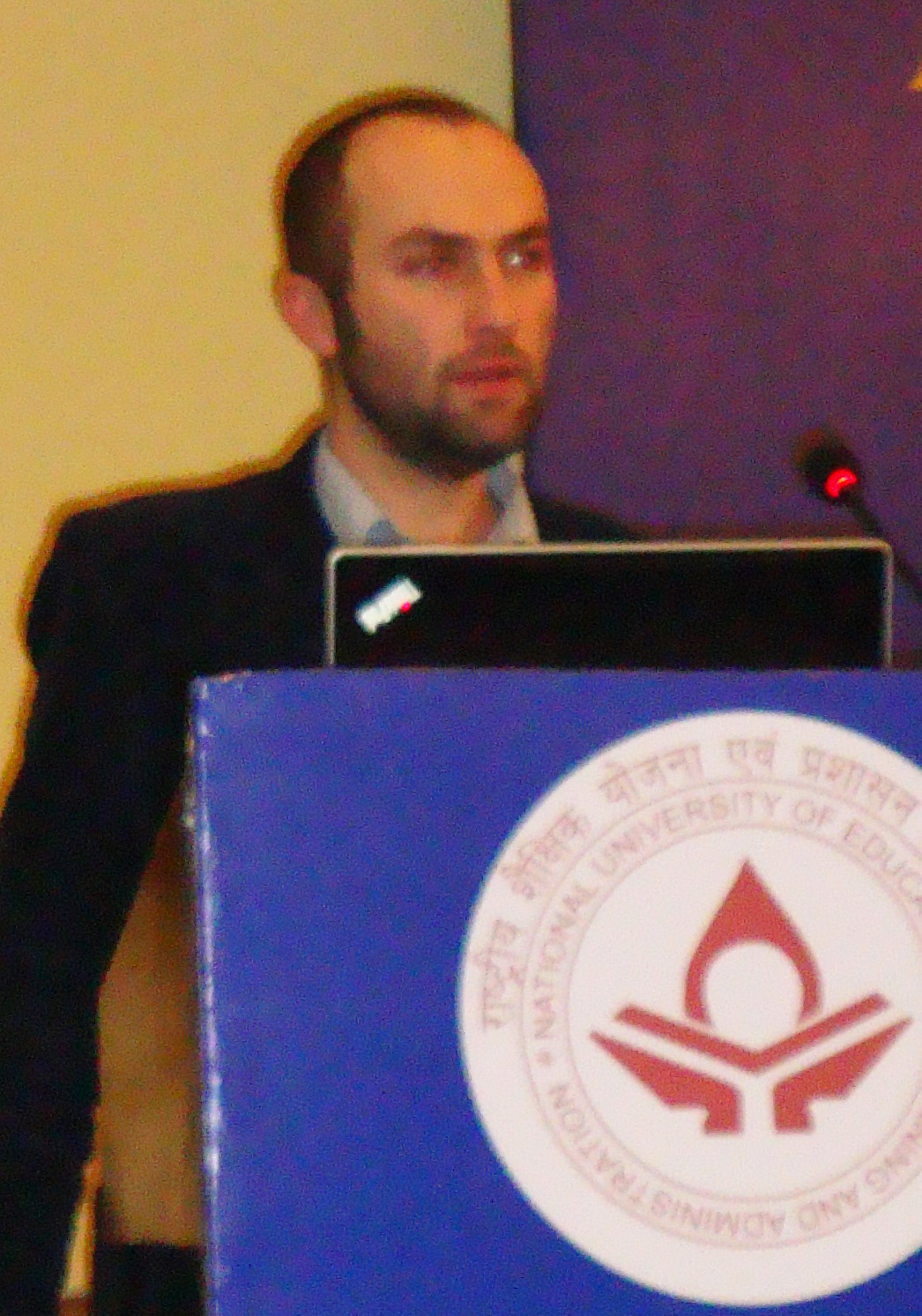
Dr Benjamin Zeitlyn, CREATE Research Fellow, University of Sussex, UK
The Country Report on Bangladesh was presented by Prof. Manzoor Ahmed on “Meeting Equity Challenges in Bangladesh – Resources and Governance” and “Poverty and Equity in Bangladesh” by Md. Altaf Hossain and Dr. Benjamin Zeitlyn (presented by Dr. Benjamin Zeitlyn) with Prof. J.B.G. Tilak as the chairman of the session. Prof. Manzoor highlighted the achievements of Bangladesh in terms of high gross enrolment and getting rid of gender disparities in primary education in the last 15 years. However, high dropout rates act as an impediment in achievement of MDG 2 and EFA goals. Professor Ahmed argued that strategic policy interventions are required, resources should be optimally utilised and quality standard should be maintained at the local level planning through proper trial of planning and management.
The debate on equity was deepened by the next report on “Poverty and Equity: Access in Education in Bangladesh” by pointing out that access to education is uneven and poor people are excluded at greater proportions. It is seen that as household income decreases, health of the children is affected leading to low attendance, contributing to low learning, i.e. silent exclusion and overall increases in rates of never enrolment and dropout. This is because poverty and access is inter-related. To counter the impact of poverty on educational access, the government has created a primary education stipend project and the girl’s secondary education stipend. These initiatives have failed to reduce the dropout rate as the quantum of stipend is less than the required monthly expenditure. As a result it was suggested to have policies that are related to initiation of school health and school feeding programmes, school equipment such as reusable textbooks, pen/pencils, notebooks, geometry boxes, school bags, which should be provided free of cost to the students. In addition to counter the regressive effects of private tuition, the curriculum should be designed in a way that majority of learning should take place in the school itself.
NUEPA employees: Renu Bish, Usha Arora, Moirti Dey and Mohammed Saim
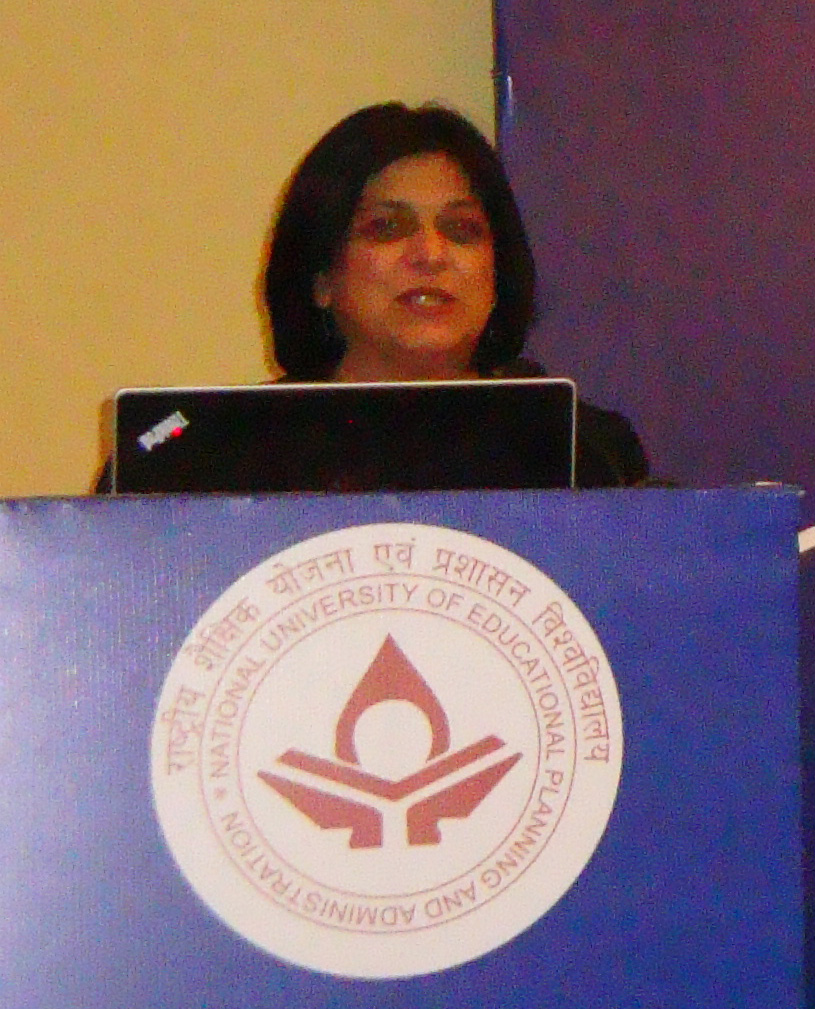
Dr Shireen Motala, University of Johannesburg, South Africa
Afternoon tea was followed by the Country Report on South Africa “Does Increasing Access to School come at the Expense of Quality in Education?: Findings from CREATE research in South Africa” by Shireen Motala and Stu Letsatsi. The paper focused on the philosophical meaning of equality and interrogated the inequality in education in South African society. The country has a history of inequality in terms of colour, political and economic issues that have had an influence to the education system both at individual or societal level. Though, educational system in South Africa is sound, many issues like inclusion, improve in participation and meaningful access persists. The learning level of the children is low and they have been pushed to next grade with repetition, children of Eastern Cape performed poorly and their health is worse in than the children in other areas. Teachers in these areas don’t have sufficient content knowledge and they lack proper understanding of teaching methodologies. Further, teachers even treat the children with disrespect and corporate punishment is rampant in the schools. Also, no interaction has been taken place between the teachers and student so, one way teaching is the norm – ‘talk and chalk’ methodologies. In addition, the speakers emphasised the need for peaceful interaction between student and teachers so that meaningful access is possible.
K. Naresh Sharma, consultant in NUEPA-CREATE, asked about the language policy for teaching in South Africa during the discussion session. The past history of South Africa has a profound impact on its present society and the education has not left behind from the clutches of that instability. One of the reasons for poor learning is that the government of South Africa has not done enough to resolve language issues in primary education and in a multiethnic society English has been the medium of instruction rather than the mother tongue, responded Prof. Motala. In addition, South Africa has one of the most expensive education systems observed Prof. Keith Lewin. The session comes to an end with the chair, Pius Augustine Ike Obanya thanking both the speakers. The first day was of the conference was concluded with the observation by Prof. Keith Lewin that the different presentations during the day reveals that there still exists different forms of exclusion in education in the world and we have to go a long way to achieve universal education.
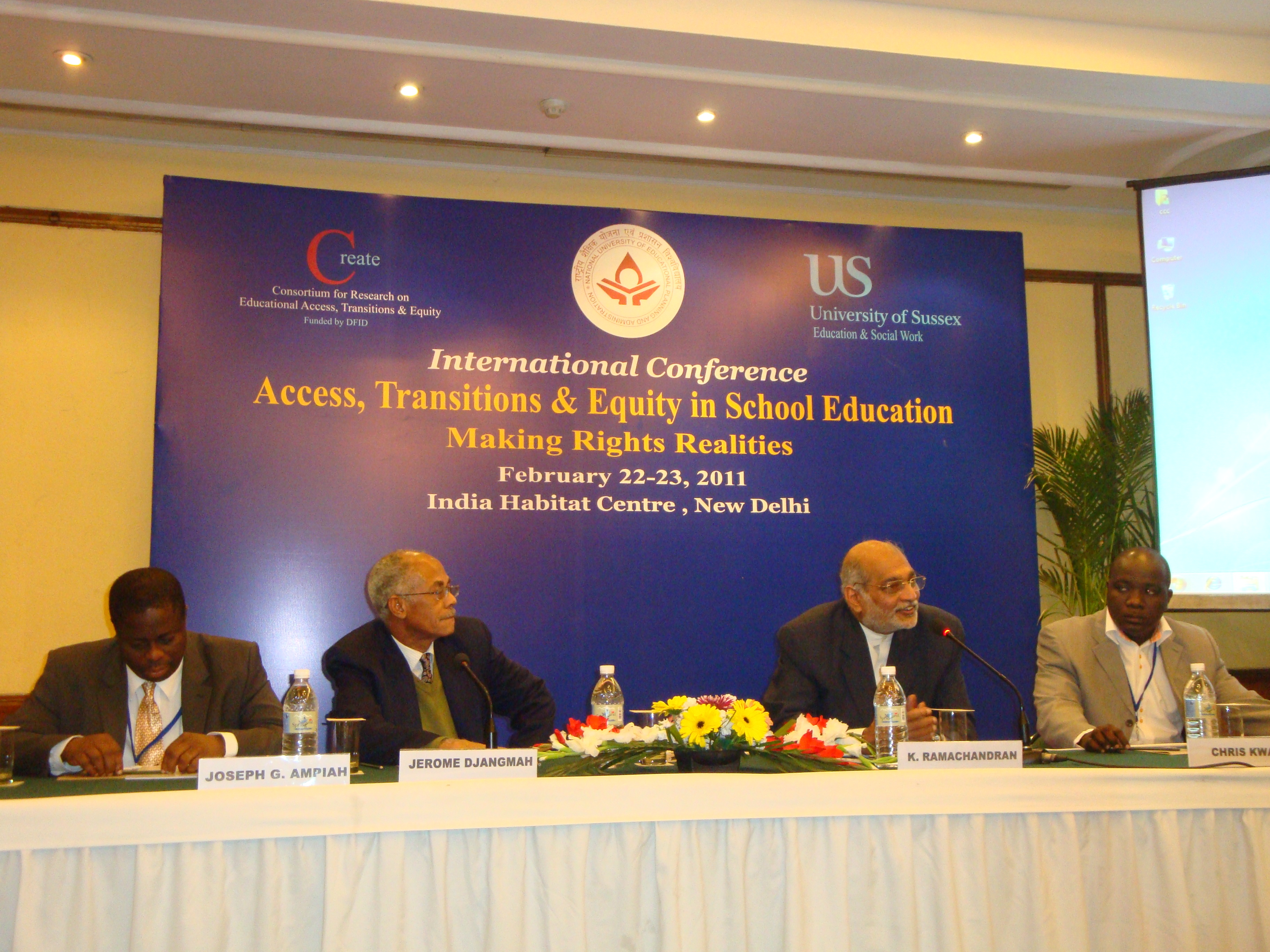
Joseph Ghartey Ampiah, Jerome Djangmah, K. Ramachandran and Chris Kwaa
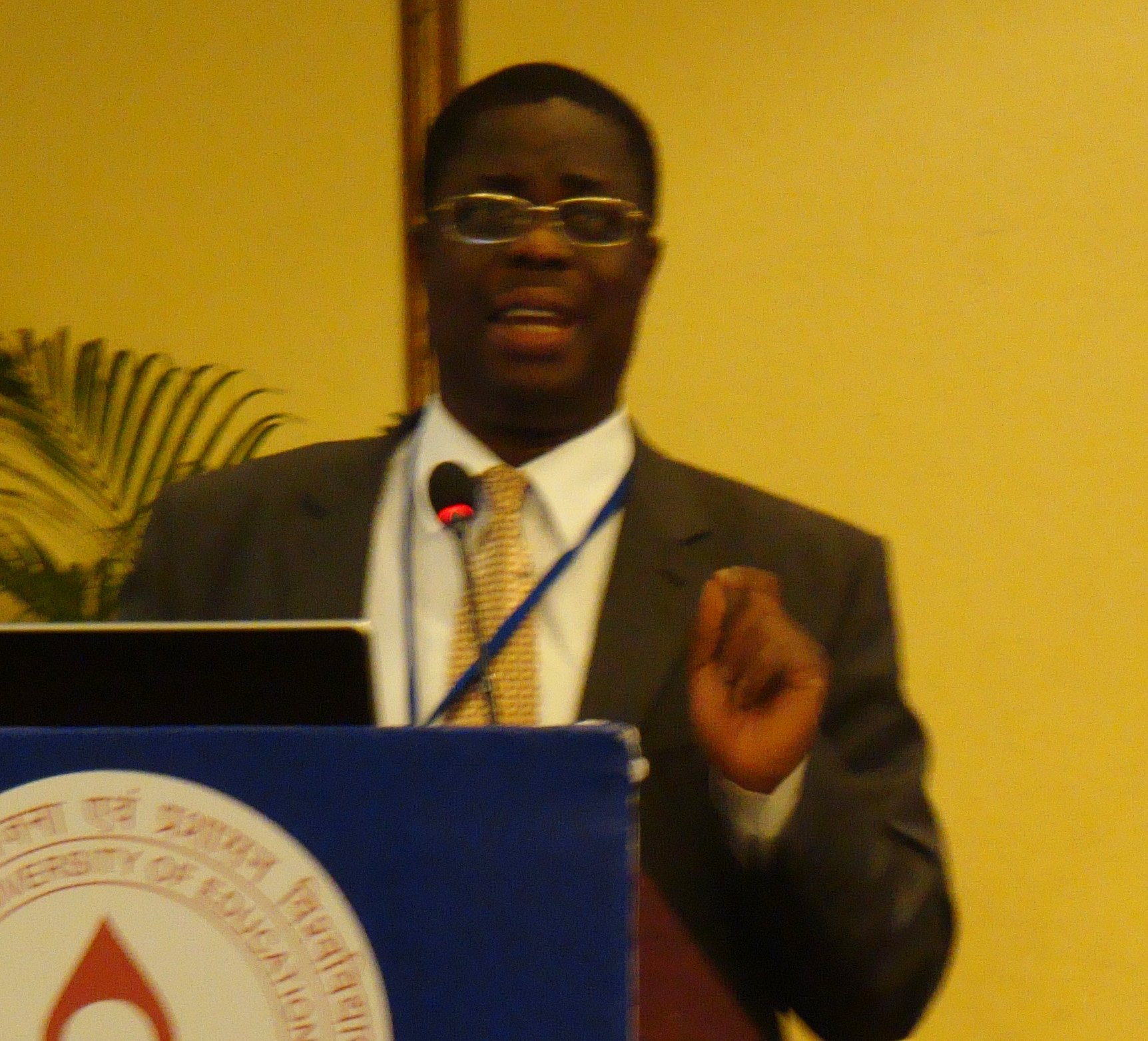
Dr Joseph Ghartey Ampiah, University of Cape Coast, Ghana
The first session of the second and last day of the conference commenced with Joseph Ghartey Ampiah, Christopher Yaw Kwaah and Prof. Jerome Djangmah presenting “Improving Access to Education in Mfantseman and Savelugu-Nation in Ghana: Exploring Enrolment, Attendance, Overage and Achievement” with K. Ramachandran as the chairman. Single parenting, poverty, illiterate parents or guardians, socio-economic activities peculiar to the community and the demand for child labour are the reasons for the children being never enrolled. Children with right age in grade attended more regularly but, there exist an issue of overage in all grades, i.e. the initiation to school begins at late age. And the over age children did not attend regularly. All these factors have an influence for the dropouts of the children were some of the findings and recommended, state intervention should be based on the characteristics of poor and marginalisation that emphasised on the appropriate age-in-grade and proper monitoring mechanism on attendance and progression.
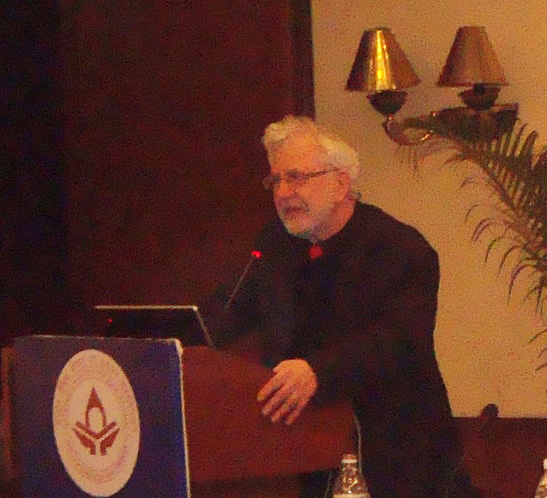
Professor Keith Lewin, Director of CREATE
After morning tea, “Changing Patterns of Access to Education” of the Second Day began with Prof. Keith Lewin’s presentation on “Expanding Excess: Who Gets What?” with Mr. Paud Murphy in the chair. Prof. Lewin, pointed out that the purpose of the paper is to look into the long term consequences in education from the survey of 13 countries and through comparative analysis. He highlighted that who gets what in education is heavily dependent on household income. Reason for this is that poverty is related to drop out and exclusion. Further, the locus of responsibility is not clear for those not going to school.
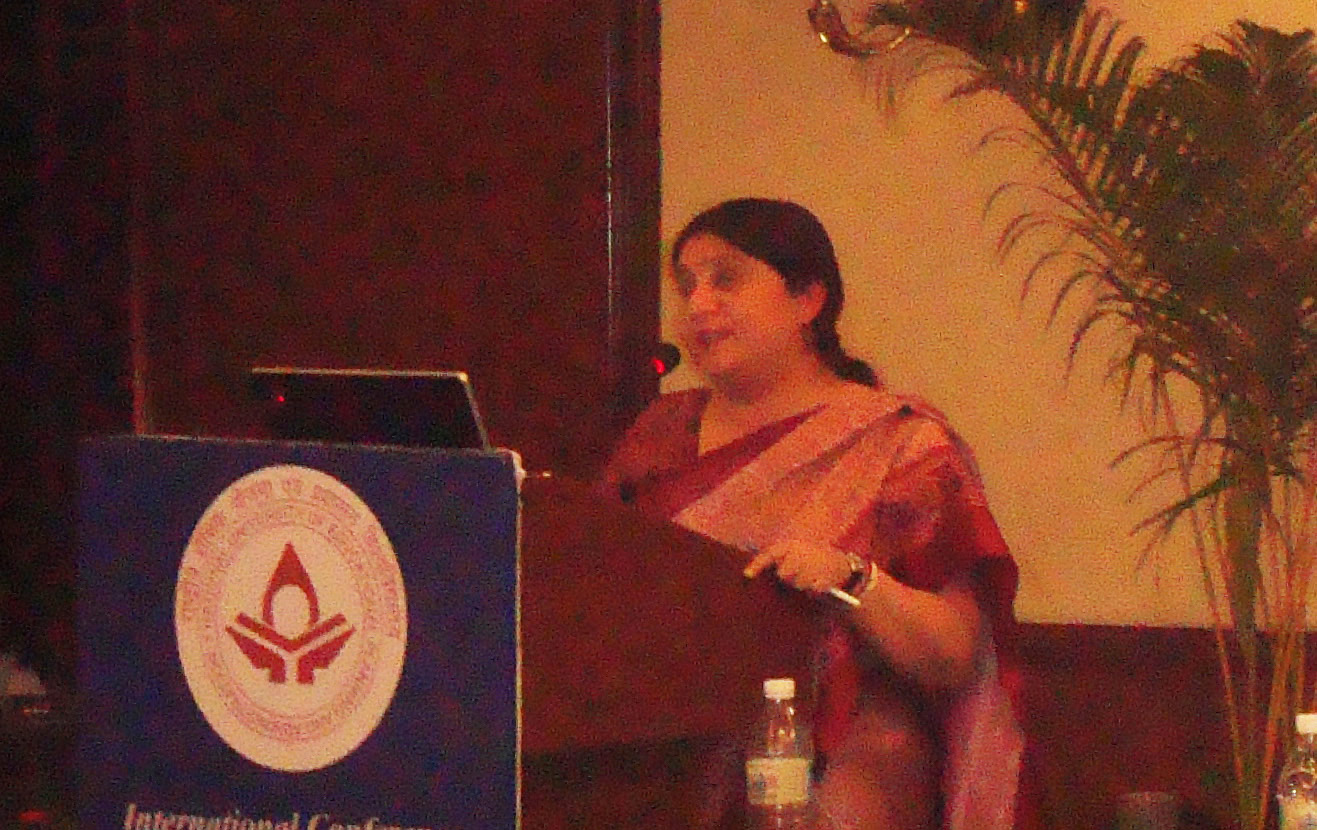
Dr. Madhumita Bandopadhyay, NUEPA
The next session, titled “Access to Education in India – Sub Studies” began with Prof. A. K. Sharma, Former Director of NCERT, as the chairperson. The session had three presenters addressing on different issues that affects India’s primary education. Dr. Madhumita Bandopadhyay looked at the relationship between gender and school participation through Access, Performance, Parent’s aspiration and Inclusive Character of School in ‘Exploring Gender and School Participation’. She contended that there exists a gender bias in the enrolment of children. It was pointed out that if the fathers are educated at high school level there is a higher chance that boys will remain in school, at the same time it is not guaranteed that their girl child shall be in the school. Further, at school gender discrimination exists as girls are engaged in sweeping and washing activities while boys are found playing in the field. All these factors have an impact on the learning level on girl child, more importantly on the children of Scheduled Caste and Scheduled Tribes, as most of them are found to have low level of comprehension and understanding both at the logic and language contended Dr. Bandyopadhyay.
Dr. B. K. Panda followed with his presentation on “Access and Participation of Indigenous Children in Residential schools of Chhatitsgarh”. Dr. Panda informed the gathering that Ashram school were established to address the issues of tribal children and the study attempts to uncover the existing pattern, status, access to the tribal habitations (their out-reach, teaching, retaining students and community involvement and participation). The lack of awareness of the teachers on the objectives and purpose of this particular model of school has resulted in the teachers engaging in a monotonous model of teaching, the infrastructures do not subscribed to the prescribed parameters and lack of support from the official departments contributed in creating an environment of fear, neglect and isolation within the teaching community and students. These factors have contributed in the ineffective learning by the children observed Dr. Panda. To move out the cycle he argued for improvement in the monitoring/feedback mechanism, assessment of various activities performed and their outcome, also improvement in infrastructures, residential facilities for teachers, and adequate food to children as necessary conditions.
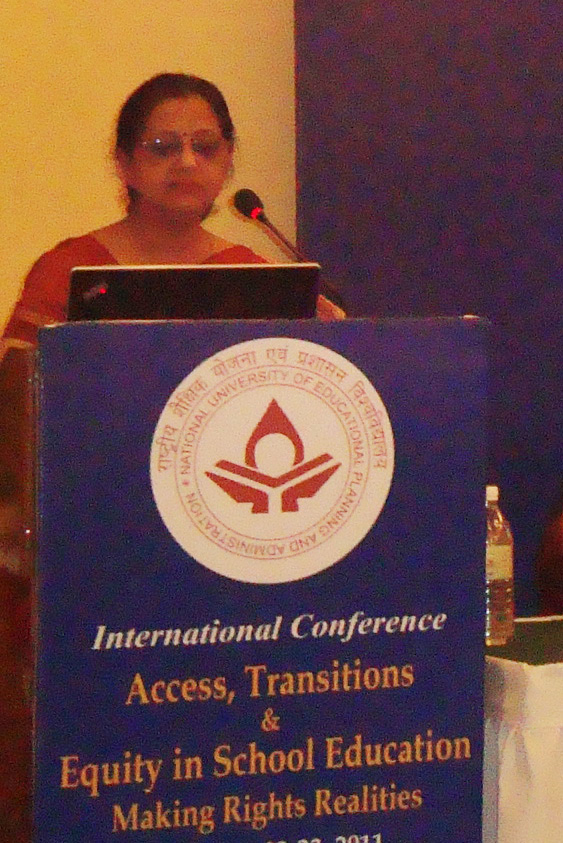
Dr. Rashmi Diwan, NUEPA
Dr. Rashmi Diwan presented her paper on “Small Schooling in India” and reiterated the need to strengthen Small School system for a more inclusive education system in the country. Small Schools are present in large numbers and caters to the most underprivileged sections of the society. The facility is avail by children of families living under the Below Poverty Line (BPL) and disadvantage caste groups. However, such an important component of schooling facility in the country is not supported by the government and lacks in teaching learning materials, playing materials and basic infrastructures. This has resulted in the lack of interest in the teachers and students in terms of learning, teaching and even exploring this model of school as a place of learning. The plethora of issues has resulted in high dropouts of children observed Dr. Diwan. Concluding her presentation, Dr. Diwan argued for the need to have policies that reduce the isolation of teachers, renewed interest in teaching and learning, improved recruiting policies for better qualified teachers and equipping Small Schools with at the minimum physical and human resources as per RTE Act 2009 for its sustenance.
In the discussion, questions pertaining to methodological issues of measurement of gender, on the need to change the policy of Ashram School system, the existence of separate policy framework for small schools in the Right to Education (RTE) bill, and the need to re-think policy recommendations were raised. Responding to the questions, Dr. Bandyopadhyay pointed out that in the competency data caste and gender interact but inequality persists in both boys and girls participation in the EGS schools. Further, more boys were going to private schools rather than girls. Dr. B.K. Panda added that there has been a lack of coordination between SSA and tribal department which hampered in the implementation of Ashram school programme. Finally, Dr. Rashmi Diwan observed that RTE does not incorporate the provision of Small Schools very well but exhort the hope that the shortcomings will be meet to suit the requirements of Small Schools. In order to address the quality issues, Teaching Learning Materials and other basic infrastructural facilities needs to be provided. Complete transformation of schools is required in tribal regions of the country.
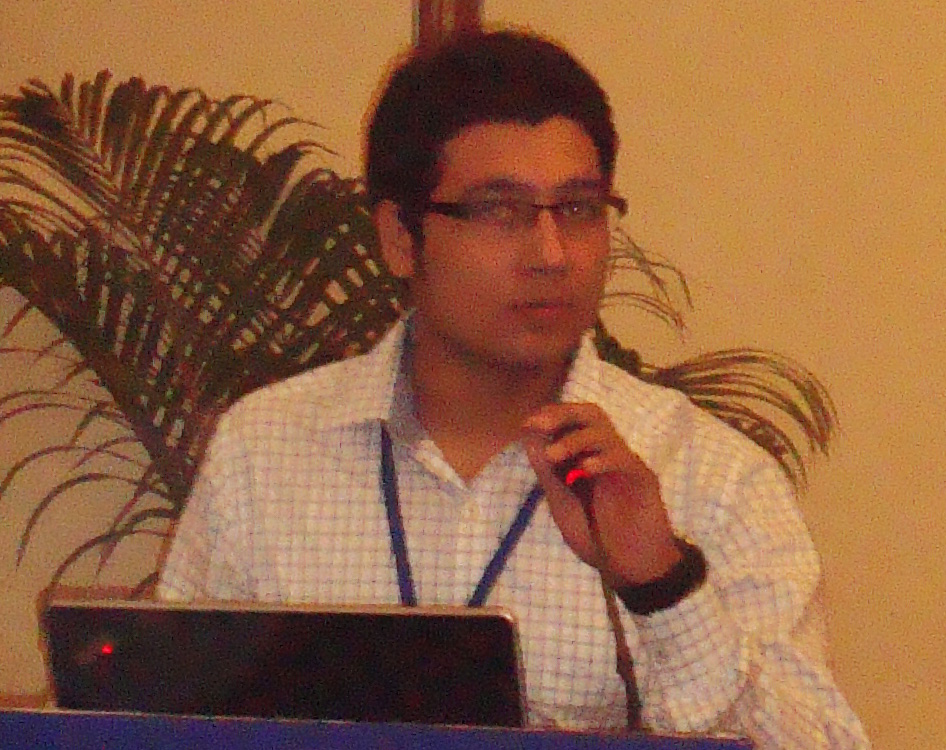
Mohammad Saim, NUEPA
The post lunch session “Outcomes of Education and Skill Development in India” began with Mr. Santosh Mehrotra as the chairman. Two papers, “Labour Market Outcomes of Education & Cognitive Skills” by Ms. Anuradha De, Ms. Geeta Kingdon and Mr. Rajeev Kumar and the other “Skills Training and Livelihood Outcomes” by Ms. Claire Noronha, Ms. Tanuka Endow and Ms. Neeru Sood were presented. Presenting the first paper, Ms. Anuradha De has argued that there is a relation between education and employment. Education with vocational skills might increase the chances of entry in the labour market. Looking at the impact of education and cognitive skills on employment both in rural and urban areas it attempts to measure the return of literacy, numeracy skills and knowing English in wages. It was revealed that with increased in education the return is more in self-employed sector rather than agriculture, also, rate of return of female wage workers is higher than the male. Most importantly, English language has a positive return at higher level of education. That is, education has a determining role in the wage for both male and female members.
The other paper “Skills Training and Livelihood Outcomes”, presented by Ms. Claire Noronha, investigated the progress in livelihood in young people – drivers, tailors and electricians – from their education and vocational training. She revealed that these communities are discriminated against in the work place and are compelled to work in small factories and shops on low wages. Though, young people from these communities are in good position to venture out in search of jobs, the process is very slow and sometimes they are trapped in poverty. They face barriers which are so strong that it is difficult to break for both less educated and more educated. Hence, they live with low wage, as low as Rs. 2600/- per month with their family. Due to fluctuation in demand, lack of market support, no back up during the time of lean earnings and low bargaining power due over supply of these workers, they suffer most of the time. Simultaneously, they have difficulty in accessing to loans, forcing the skilled person to be dependent on the family. Since, there work is depended on the demand of the market they are forced to shift in other works with more remuneration than their earlier work. Nevertheless, there are chances or mechanisms to improve the standard of living by availing the opportunities being offered by the government. As a result, there is a need to increase the opportunity by providing training to those with lower education and the state should create more employment opportunities and provides employment support were observed by Noronha.
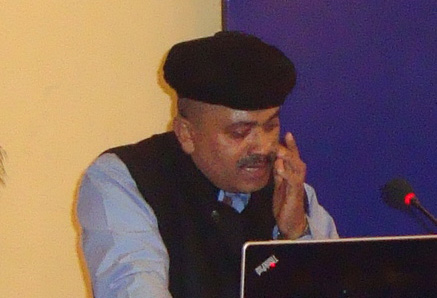
Prof. A. K. Singh, NUEPA
The afternoon session on thematic presentation was chaired by Ms. Shobita Rajgopal. Prof. A. K. Singh presented “Local School Management” and Mr. D. Jhingran on “Reading Failure in Education Primary Grades”. Prof. Singh observed that the objectives of the study are to study the policies and procedures regarding formation and compositions of the committees, to examine the expected and actual roles and functions of the committees, to study initiatives towards capacity building of the committee members, to study monitoring mechanisms of the committees and to suggest measures for effective functioning of committees. He observed that there are 9 different types of committees are functioning in the country both in urban and rural areas with the same nomenclature, but that legal provisions for community participation is weak in most states. The quality of education and overall development of school is one of the main challenges before the committees, the capacity of the members is far from adequate, functional linkages of the committees with PRI/local bodies are weak, even where structural linkage exist and people’s participation in school management in urban areas is a complex issue which needs to be treated separately. Hence there was as, Dr. Singh pointed out, a lack of interest and accountability among committee members, which reinforced the need for statutory provisions for people’s participation in school education in the Right to Education Act. There is a need to shift from Enrolment and Attendance to Overall School Development. Larger representation to the main stakeholders (3/4th parents) with proportionate distribution to the special focus groups (50% women) should be ensured. At the same time, building capacity for members – a precondition for effective participation in school activities (SDP) – with clear roles between school committee and local authorities.
D. Jhingran argued that children are not learning to read well in I and II grades. Based on a comparative study of five countries – India, Bangladesh, Sri Lanka, Nepal and South Africa, he explained that in all these countries children did not perform to the grade expectation. There exist high disparities within the classroom in reading levels from II grade onwards and low comprehension on inferential questions. So, Jhingran reinforced the need for inculcating the habit of reading early for effective learning in higher grades.
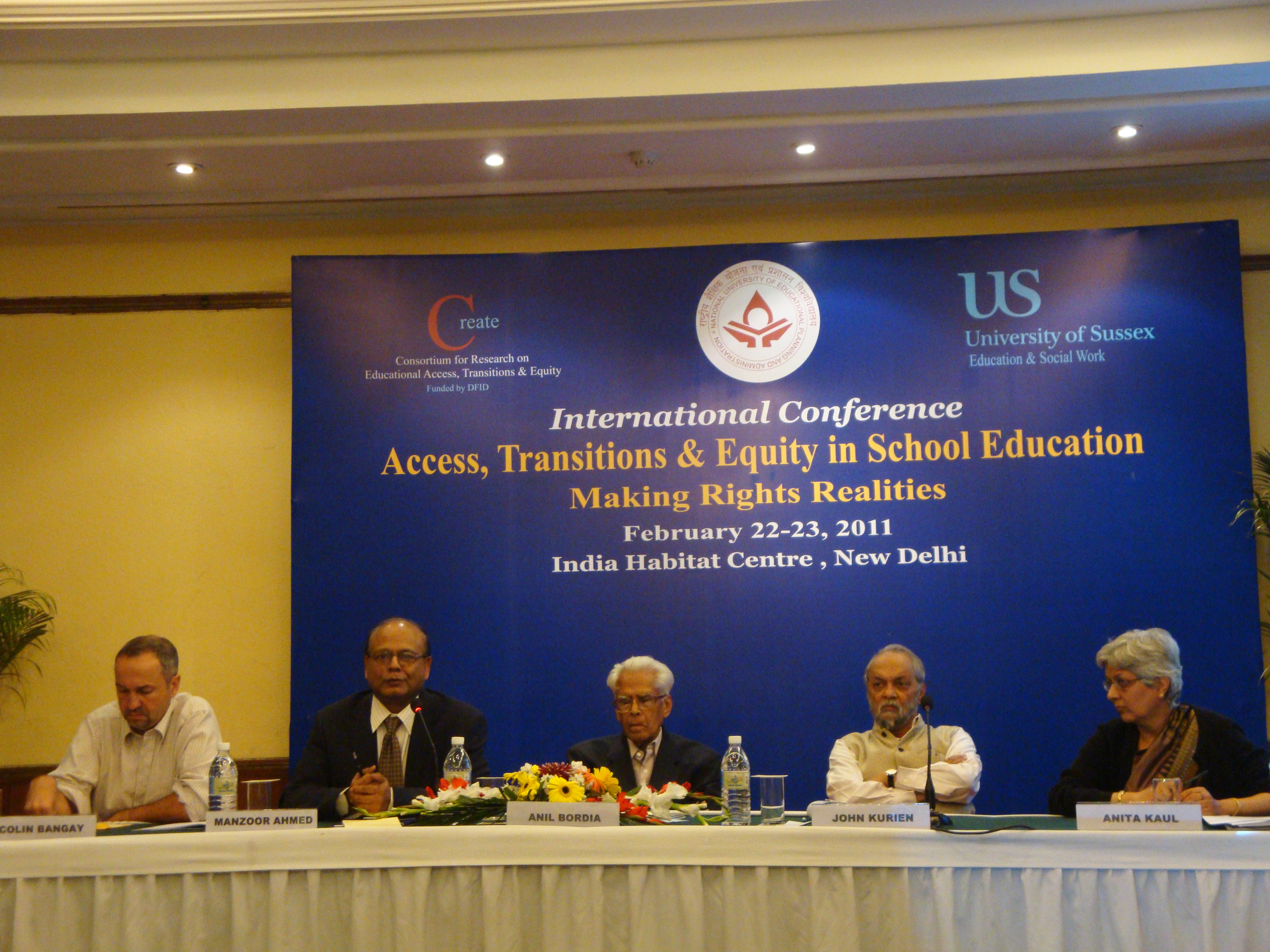
Round Table panel discussion - Colin Bangay, Manzoor Ahmed, Anil Bordia, John Kurien and Secretary Anita Kaul
The last session, of the conference started with Mr. Anil Bordia in the chair. Initiating a panel discussion, Mr. John Kurien, raised two fundamental issues on pedagogy and equity in education. He pointed out that there has been an increase in the demand of English medium school in the country during the last 10 years and a corresponding opening of “English medium schools” through public private partnership. The response of the government, the introduction of English in 1st grade, due to the demand of the parents, creates an environment of incomprehensible education for children. In addition, there has been a shift in enrolment from government to privately managed schools. Consequently, there has been a shift from vernacular learning and teaching to English. Transformation in the teaching and learning process undermines the issue of equity in education. This is because in a country like India where 42% of worlds undernourished children reside and 54% of the children are out of school there is a need to invest in pre primary education and care, most importantly in the age group from 0 to 5 years.
Deepening the debate, Dr. Manzoor Ahmed, pointed out that the Indian education system has become regressive by not promoting equity. Rather it reproduces and reinforces already existing inequalities. To get out the vicious cycle, discussion on governance and management, on the issue of accountability, in a decentralised structure may be an alternative. The involvement of communities may bring about a positive change in some indicators of quality of education. In this connection, the role of teachers becomes preeminent. Quality in education can be achieved through induction of the best and brightest into the teaching profession.
The pivotal role of teacher and the need to have “quality teacher training programme” in education was reemphasised by Anita Kaul, Additional Secretary, Department of School Education & Literacy, MoHRD, GoI. In addition, there should be reasonable Teacher Pupil Ratio, a class room to a teacher, no withdrawal of teachers for non academic works and extraction tuition by the teachers. According to her coming into force of “Right to Education” and insertion of Article 21A, Fundamental Right to Education, in the constitution shall bring a change in the education system in India. Subsequently, the government has made changes in the framework of Sarva Shiksha Abhiyan and committed 2.31 lakh crore rupees in the next five years. Yet, she also expresses concern on the issues of “right to admission,” “attendance,” “completion of elementary education” and “presence of overage”. Acknowledging that the issues are systemic in nature, Ms. Kaul, is of the view that the issues can be solved through systemic reforms. In this connection “birth and transfer certificates” may be of vital importance and even more an environment of non-discrimination, free from fear and large participation of parents.
In such a circumstance, the challenge is to have data and using it to make an agent of change in policy because the fundamental purpose of education is meaningful learning observed Dr. Colin Bangay. He acknowledged that there has been a increase in input and output of education due the efforts made to meet the Millennium Development Goals.
The session concluded with the observation of Mr. Anil Bordia that a discrimination free world shall be productive for education system. This is achievable only when disadvantaged families get the advantages and opportunities of the education system.
The curtain to the conference came down with Prof. Keith Lewin and Prof. R. Govinda acknowledging the contribution made by the members of the consortium. Prof Lewin also thanks all of them for the long partnership. Prof. Govinda highlighted the positive development have been made. Though the journey is still long way to go we also need to thank ourselves for the good work done in the education sector.
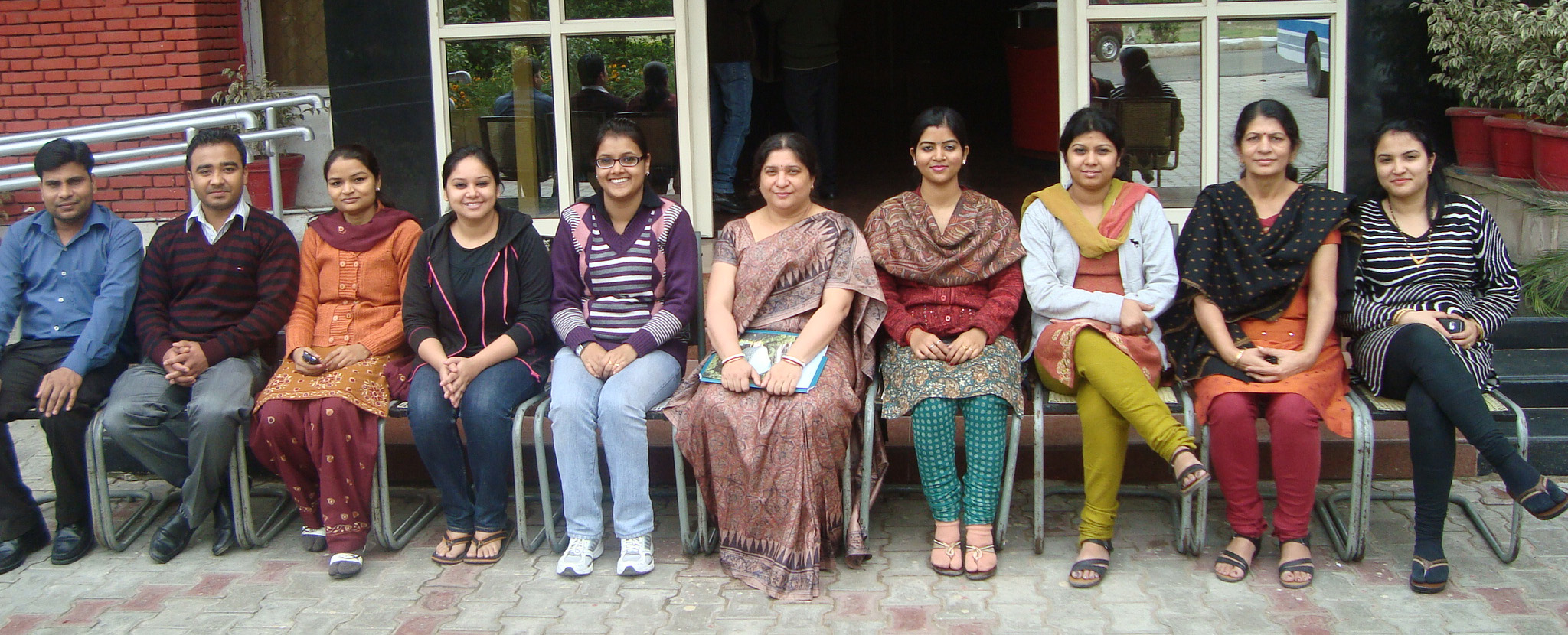
NUEPA employees: Jyoti Ranjan Sahoo, Rahul Joshi, Meenu Negi, Debanjana Das, Moitri Dey, Madhumita Bandyopadhyay, Renu Bish, Puja Kirar, Usha Arora and Renu Giroti
Powerpoint presentations:
Overcoming Exclusion Through Quality Education in India - R. Govinda, NUEPA, India
The Politics, Policies and Progress of Basic Education in Sri Lanka - Angela Little, Institute of Education, London, UK
Meeting Equity Challenges in Bangladesh - Resources and Governance - Manzoor Ahmed, BRAC, Bangladesh.
Poverty and Equity in Bangladesh - Altaf Hossain & Benjamin Zeitlyn, BRAC, Bangladesh / University of Sussex, UK.
Does Increasing Access to Schools Come at the Expense of Quality in Education?: Findings from CREATE research in South Africa - Shireen Motala & Stu Letsatsi, University of Johannesburg, South Africa.
Improving Access to Education in Mfantesman and Savelugu Nanton in Ghana – Exploring Enrolment, Attendance, Overage and Achievement - Joseph Ghartey Ampiah & Christopher Yaw Kwaah, University of Cape Coast, Ghana / Jerome Djangmah, University of Education, Winneba, Ghana.
Changing Patterns of Access in South Asia and Sub-Saharan Africa: Who Gets What ? - Keith Lewin, University of Sussex, UK.
Exploring Gender and School Participation – Madhumita Bandyopadhyay, NUEPA, India
Access and Participation of Scheduled Tribe Children in Ashram Schools of Chhattisgarh – B.K. Panda, NUEPA, India.
Exploring small schools in multiple context – Rashmi Diwan, NUEPA, India.
Labour Market Outcomes of Education- Anuradha De, Geeta Kingdon and Rajeev Kumar.
Mobility Through Education and Skills Training- Claire Noronha, Tanuka Endow, Neeru Sood.
Local Management of Schools: Evidence from a Field Based Study- A. K. Singh, NUEPA, India.
Reading Failure in Early Primary Grades: A Serious Challenge to Equity in Primary Education - Dhir Jhingran.